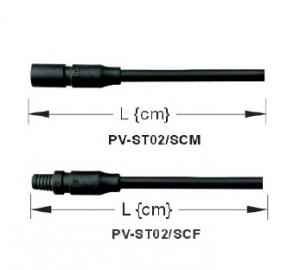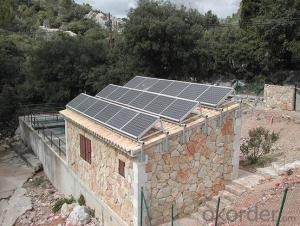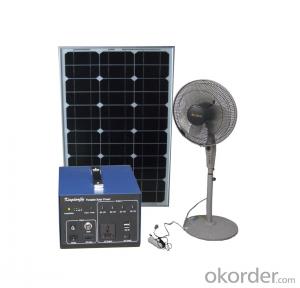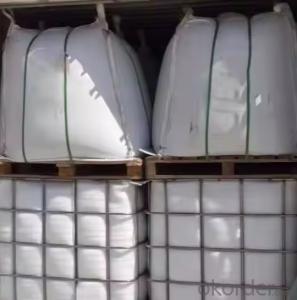Solar cable Connector PV-ST02 SCM SCF
- Loading Port:
- China Main Port
- Payment Terms:
- TT OR LC
- Min Order Qty:
- -
- Supply Capability:
- 10000 set/month
OKorder Service Pledge
OKorder Financial Service
You Might Also Like
Solar Cable-Connectors,Due to highly robustness,UV-resistance,the touch protection a high grade connection is guaranteed for many years
Rated voltage 1000 V
Rated current 20A
Dia.of pin or socket 3mm
Protection degree(mated,junction box closed/unmated) IP67/IP2X
Operating temperature -40 °c to +85 °c
Contact material Copper,silver plated
Cable cross on request: 2.5mm2 4mm2
- Q:Can a solar energy system be used to power electric vehicles?
- Yes, a solar energy system can be used to power electric vehicles. Solar panels can be installed on a roof or any other suitable surface to capture sunlight and convert it into electricity. This electricity can then be used to charge the batteries of electric vehicles, providing a clean and renewable source of energy. In fact, many people have already started using solar energy to power their electric cars, creating a sustainable and eco-friendly transportation solution. Additionally, advancements in solar technology have made it more efficient and cost-effective, making it an increasingly viable option for powering electric vehicles.
- Q:Can solar energy systems be used for heating and cooling homes?
- Yes, solar energy systems can be used for heating and cooling homes. Solar thermal systems can capture the sun's heat and use it to provide hot water or space heating. Additionally, solar-powered air conditioning systems can use solar energy to cool homes by absorbing heat from the indoor air and dissipating it outside.
- Q:How do solar energy systems store excess energy?
- Solar energy systems store excess energy by using batteries or a process called net metering. With batteries, the excess energy generated by the solar panels is stored in these batteries for later use when the panels are not producing enough energy, such as during the night or on cloudy days. Net metering, on the other hand, allows the excess energy to be fed back into the grid, where it is credited to the owner's account. This excess energy can then be used at a later time when the solar panels are not producing enough power.
- Q:Can solar energy systems be used in areas with high levels of hail or other severe weather conditions?
- Yes, solar energy systems can be used in areas with high levels of hail or other severe weather conditions. While severe weather conditions like hail can potentially damage solar panels, modern solar panels are designed to withstand various weather conditions, including hailstones of a certain size and velocity. Solar panels are typically made with durable materials such as tempered glass and are tested to withstand hailstones of a specific size and impact force. They are engineered to be strong enough to endure hailstorms without shattering or losing their efficiency. Additionally, solar panels are often installed at an angle to allow hailstones to slide off rather than directly impact the surface, further minimizing the risk of damage. Furthermore, advancements in solar technology have led to the development of more robust and resilient solar panels. For instance, some manufacturers offer panels with enhanced hail-resistant features, such as reinforced glass or protective coatings, to provide extra durability in areas prone to severe weather conditions. It is important to note that while solar panels can withstand hail, the severity and frequency of the hailstorms should be taken into consideration when planning and installing solar energy systems. Local weather patterns and historical data can help assess the risk level and determine the appropriate measures for protecting the panels, such as using hail guards or installing additional protective layers. In conclusion, solar energy systems can be used in areas with high levels of hail or other severe weather conditions as long as the panels are designed and installed to withstand such conditions. Proper planning, the use of resilient materials, and periodic maintenance can help ensure the long-term performance and durability of solar energy systems in these areas.
- Q:How does the efficiency of solar panels vary across different installation locations?
- The efficiency of solar panels varies across different installation locations due to various factors such as the amount of sunlight received, the angle and orientation of the panels, shading, temperature, and local weather conditions.
- Q:Can solar energy systems be used for powering recreational vehicles or boats?
- Certainly, solar energy systems can be utilized to power recreational vehicles (RVs) and boats. The utilization of solar power is gaining popularity within the RV and boating communities due to its various advantages. The installation of solar panels on the roofs of RVs and boats enables the absorption of sunlight and its conversion into electricity. This electricity can then be employed to power various appliances and systems on board, such as lighting, refrigeration, air conditioning, and even device charging. The primary advantage of employing solar energy for RVs and boats is that it provides a clean and renewable source of power. By harnessing the energy of the sun, users can significantly reduce or eliminate their dependency on conventional fossil fuel generators. This not only aids in diminishing carbon emissions and minimizing environmental impact but also leads to long-term savings on fuel expenses. Moreover, solar power systems are highly adaptable and can be customized to meet the specific energy requirements of RVs and boats. They can be designed to be easily portable and deployable, allowing users to take advantage of solar energy wherever they travel. Furthermore, advancements in solar technology have improved the efficiency and durability of panels, ensuring reliable power generation even in adverse weather conditions. It is crucial to carefully consider the size and capacity of the solar energy system to meet the energy needs of the RV or boat. The number of solar panels and batteries required will depend on factors such as the size of the vehicle or vessel, energy consumption, and desired level of self-sufficiency. In conclusion, solar energy systems present a viable and sustainable option for powering recreational vehicles and boats. They offer numerous benefits, including reduced reliance on fossil fuels, cost savings, and environmental friendliness. With advancements in technology, solar power is becoming increasingly accessible and efficient, making it an attractive choice for those seeking to power their RVs or boats with renewable energy.
- Q:What is the impact of electromagnetic interference on solar energy system performance?
- Electromagnetic interference can have a negative impact on the performance of solar energy systems. It can disrupt the communication and control signals within the system, leading to reduced efficiency and functionality. Additionally, electromagnetic interference can introduce noise and disturbances in the power output, affecting the overall reliability and stability of the system. Therefore, proper shielding and mitigation techniques need to be implemented to minimize the impact of electromagnetic interference on solar energy system performance.
- Q:Can solar energy systems be used in areas with limited access to sanitation facilities?
- Yes, solar energy systems can be used in areas with limited access to sanitation facilities. Solar energy systems, such as solar panels, can provide electricity to power water pumps, filtration systems, or other sanitation equipment. This can help improve access to clean water and sanitation in areas that lack traditional infrastructure. Additionally, solar energy systems can operate independently of the grid, making them suitable for remote or off-grid locations without access to reliable sanitation facilities.
- Q:How do solar energy systems impact the carbon footprint of a home?
- Solar energy systems have a significant positive impact on reducing the carbon footprint of a home. By harnessing the power of the sun, these systems generate clean and renewable energy, which reduces or even eliminates the need for fossil fuel-based electricity. This transition to solar energy decreases the home's reliance on carbon-intensive power sources, resulting in a substantial reduction in greenhouse gas emissions and ultimately contributing to a more sustainable and environmentally friendly lifestyle.
- Q:Can solar panels be used to power agricultural irrigation systems?
- Yes, solar panels can be used to power agricultural irrigation systems. Solar panels can generate electricity that can then be used to power pumps, motors, or other equipment needed for irrigation systems. This helps reduce reliance on traditional energy sources and can make irrigation more sustainable and cost-effective for farmers.
1. Manufacturer Overview |
|
|---|---|
| Location | |
| Year Established | |
| Annual Output Value | |
| Main Markets | |
| Company Certifications | |
2. Manufacturer Certificates |
|
|---|---|
| a) Certification Name | |
| Range | |
| Reference | |
| Validity Period | |
3. Manufacturer Capability |
|
|---|---|
| a)Trade Capacity | |
| Nearest Port | |
| Export Percentage | |
| No.of Employees in Trade Department | |
| Language Spoken: | |
| b)Factory Information | |
| Factory Size: | |
| No. of Production Lines | |
| Contract Manufacturing | |
| Product Price Range | |
Send your message to us
Solar cable Connector PV-ST02 SCM SCF
- Loading Port:
- China Main Port
- Payment Terms:
- TT OR LC
- Min Order Qty:
- -
- Supply Capability:
- 10000 set/month
OKorder Service Pledge
OKorder Financial Service
Similar products
New products
Hot products
Hot Searches
Related keywords




























